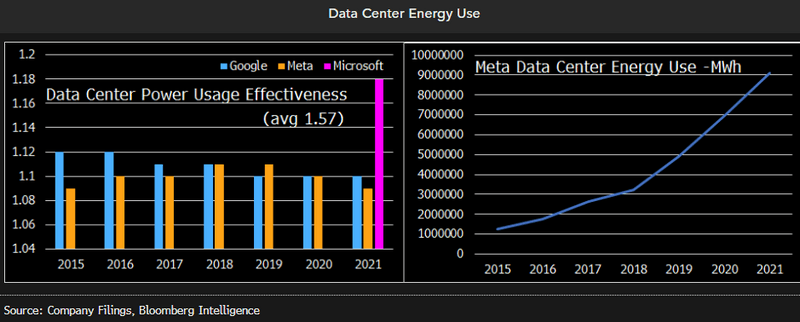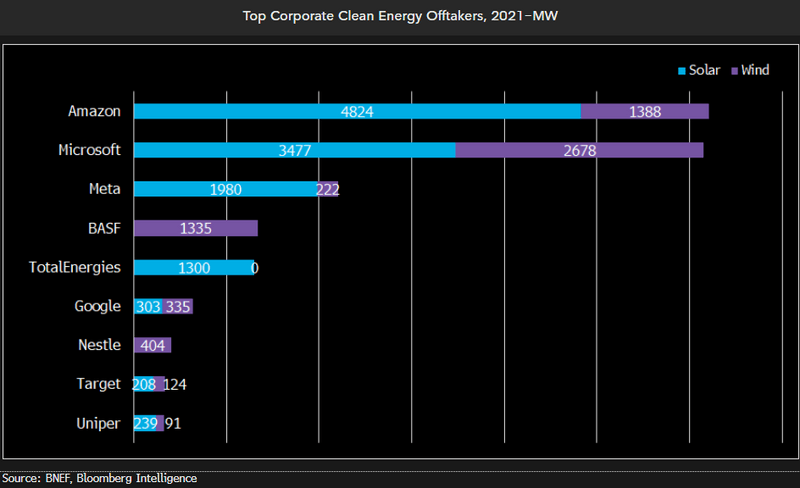Data centers can lessen resource scrutiny, aid profits
This analysis is by Bloomberg Intelligence ESG Analyst Gail Glazerman. It appeared first on the Bloomberg Terminal.
With governments and local communities starting to notice the significant water and energy use by data centers, companies like Meta, Alphabet, Microsoft and Amazon can address pushback, drive profitability and reduce risk by finding ways to lessen their resource use. Data-center projects for all these companies recently struggled with permitting.
Multiple benefits of managing data-center energy use
Alphabet delivers 5x the computing power as it did five years ago with the same amount of electricity, which could help contain costs as operations grow. Given the rapid acceleration of data traffic, managing energy efficiency is not only green but also important for data centers’ profitability. They’re increasingly competing for cloud customers on energy efficiency. Alphabet, Microsoft and Amazon are more efficient than the industry, driving down overall energy intensity as they gain share. IEA estimates that from 2010-20, global data-center energy use was stable despite a 9x increase in workloads. Efficiency not only saves on operating costs, but can help allay mounting social concerns about resource use.
Meta’s data-center power usage effectiveness is marginally ahead of Alphabet and 7.5% better than Microsoft.

Data centers’ climate exposure linked to resources
This summer, Google and Oracle data centers suffered outages in the UK as extreme heat affected cooling systems. Companies sprayed water on roof-mounted cooling systems to prevent overheating. A 2021 cold snap in Texas lowered Meta’s net income 1%. High resource requirements expose data centers to climate and related regulatory risks, which could impede growth. Thames Water launched a review of the practice of using potable water to cool data centers during a drought. Companies addressing such scrutiny may need to invest in new technology and collaborations to identify alternatives such as rain or recycled water. Using less water could require more energy to cool facilities.
Tech companies have a history of innovating to manage resource use and may need to accelerate spending to secure future permits and enable growth.r
Data-center scale a double-edged sword
Meta, Amazon, Alphabet and Microsoft have paused or abandoned planned European data-center projects due to scrutiny of their resource use. Hyperscale data centers are significantly more efficient, but still require massive amounts of energy and water, offering relatively minimal employment as an offset. This has drawn local blowback. The Netherlands and Ireland set moratoriums on projects in the past year. Several European countries are calling for stricter data-center efficiency rules. Some US-based projects have also faced challenges, particularly related to water use in drought-stricken communities.
Companies can address these societal concerns and attain approvals to grow while improving operating metrics through innovation. Meta said that enhancements in cooling made its sites 80% more water-efficient than average.
Not a coincidence tech leads in renewable energy
Amazon, Microsoft, Meta and Google are top corporate buyers of renewable energy, with 100% of Google, Meta and Microsoft’s electricity coming from renewables. Amazon trails at 85%, but targets 100% by 2025; its 2022 clean-energy purchases are 50% more than the next nine buyers combined. The industry is starting to focus on ensuring that renewable purchases match actual consumption in terms of timing/geography.
Reduced exposure to volatile fossil fuels could help earnings predictability. Amazon recently cited pressure on data-center energy caused by rising natural gas prices. Lowering GHG emissions via renewables could insulate companies against government-mandated curbs. Tech reliance on renewables may lessen governmental concerns as companies seek to develop new sites that contribute to global emission-reduction goals.
